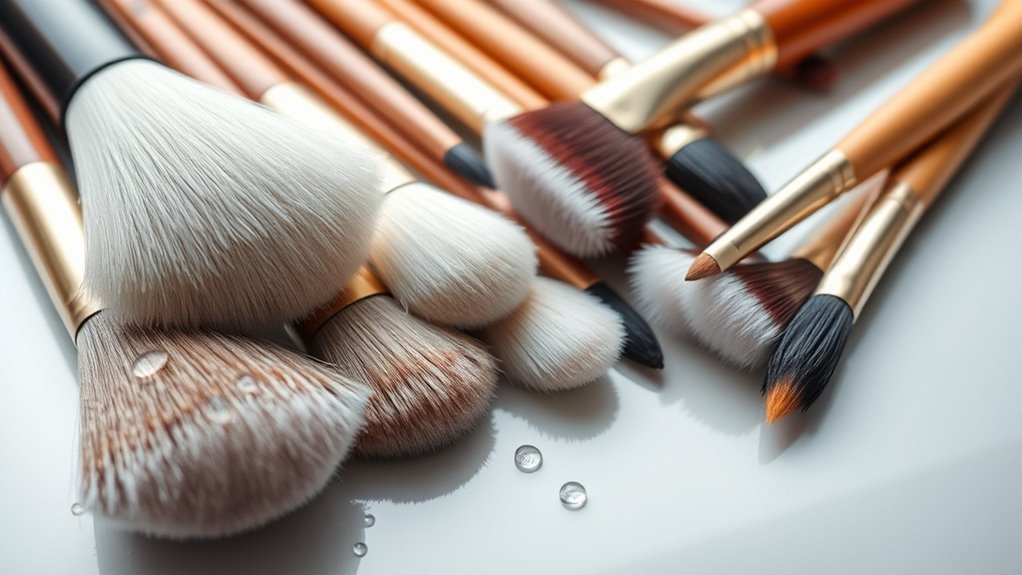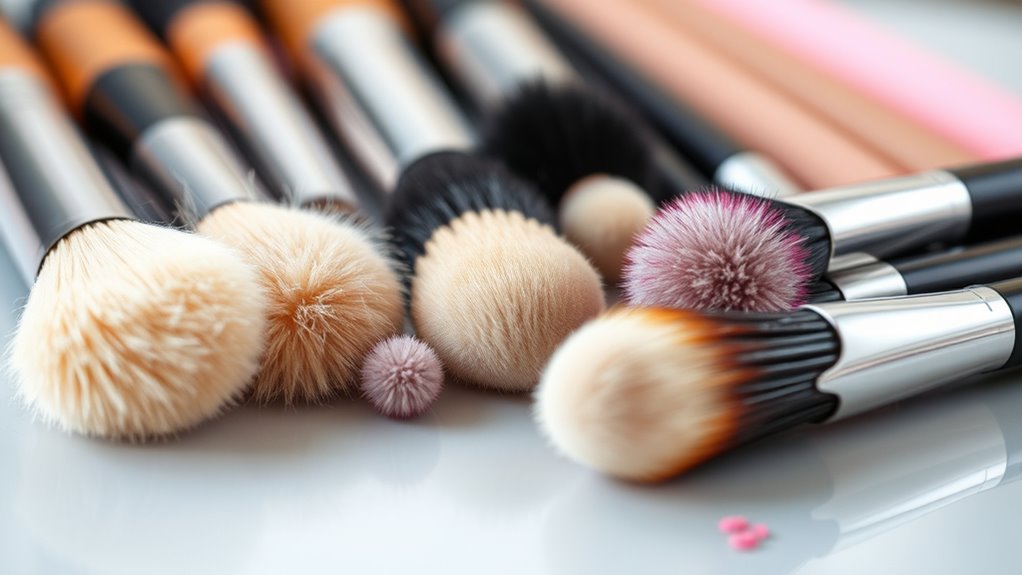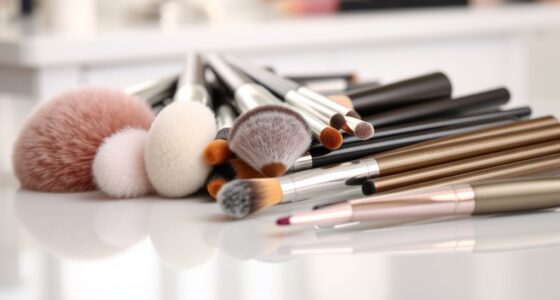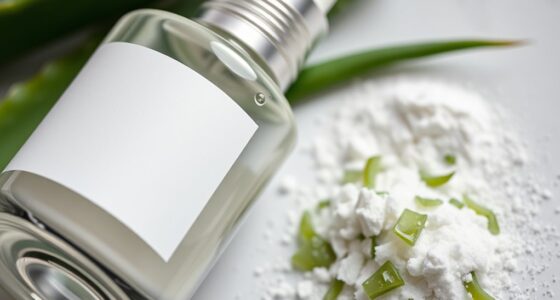To keep your makeup looking flawless, you should understand the different brush types, like natural fibers for powders and synthetic for creams, and use them properly. Regular cleaning with gentle cleansers prevents bacteria buildup and extends their lifespan. Store brushes upright or in cases to maintain their shape and avoid damage. High-quality brushes not only improve your makeup application but also last longer if you follow proper hygiene and maintenance tips—continue exploring to discover all the secrets for perfect, professional results.
Key Takeaways
- Understand different brush types (natural vs synthetic) and their best uses for powders, liquids, or creams.
- Use proper storage methods like upright holders or pouches to keep brushes clean and maintain their shape.
- Clean brushes regularly with gentle cleansers to prevent bacteria buildup and prolong their lifespan.
- Choose high-quality brushes for better blending, smoother application, and improved makeup results.
- Maintain brushes by avoiding damage, repairing frayed bristles, and replacing worn-out tools for optimal performance.

Have you ever wondered why the right makeup brushes can make all the difference in your beauty routine? It’s because the quality of your brushes directly affects how smoothly your makeup applies and how flawless your look turns out. One key factor to consider is the brush material. Brushes can be made from natural fibers, synthetic bristles, or a blend of both. Natural brushes, often made from animal hair like sable or goat, tend to hold onto powders better, making them ideal for applying blush or eyeshadow. Synthetic brushes, usually crafted from nylon or taklon, are perfect for liquids and creams because they don’t absorb product and are easier to clean. Choosing the right brush material ensures you get the desired finish, whether you want a soft, blended look or a more precise application.
Choosing the right brushes ensures flawless, smooth makeup application and a perfect finish.
Another essential aspect is brush storage, which often gets overlooked but is vital for maintaining your brushes’ longevity and hygiene. Proper storage keeps your brushes in good shape, prevents bacterial buildup, and makes your makeup routine more efficient. You can opt for brush holders, cases, or pouches designed specifically to keep brushes separated and protected. For daily use, a brush holder with individual slots helps prevent bristles from getting bent or frayed. When you’re not using your brushes, storing them upright in a clean, dry cup or a dedicated brush roll keeps them accessible and safe from dust. Avoid tossing your brushes loosely into a drawer, as this can damage the bristles and make cleaning more difficult later on. Good storage habits also make it easier to select the right brush quickly, saving you time and frustration during your makeup routine.
In addition to brush material and storage, regular cleaning is essential. Dirty brushes can harbor bacteria, which might cause breakouts or skin irritation. Using gentle brush cleansers or mild shampoo, you should wash your brushes at least once a week, especially if you wear makeup daily. Rinse thoroughly to guarantee all product residue is gone, then lay your brushes flat on a towel to dry. Avoid standing them upright while wet, as water can seep into the ferrule and loosen the glue holding the bristles, damaging your brushes over time. Proper cleaning and storage extend the lifespan of your brushes, keeping them in top condition for many uses to come. Moreover, choosing brushes made from high-quality materials can significantly improve their durability and application performance over time.
Ultimately, paying attention to your brush material and how you store your brushes can elevate your makeup game considerably. When you select high-quality brushes suited to your needs and keep them well-maintained, you’ll notice your makeup applying more smoothly, blending better, and lasting longer.
Frequently Asked Questions
How Often Should I Replace My Makeup Brushes?
You might wonder how often to replace your makeup brushes. Generally, the replacement frequency depends on brush material and usage. Synthetic brushes tend to last longer, about 1-2 years, while natural hair brushes might need replacing every 6-12 months. Regular cleaning helps extend their lifespan, but watch for signs of wear or shedding. When brushes become frayed or lose their shape, it’s time for a substitute to ensure flawless application.
Are Synthetic Brushes Better Than Natural Hair Brushes?
Did you know 60% of makeup artists prefer synthetic brushes? When comparing brush material, synthetic options are often better for hygiene and precision, especially with liquid or cream products. They’re also cruelty-free, making them a more ethical choice. Natural hair brushes, while traditionally favored for powders, can harbor bacteria more easily. Ultimately, your choice depends on your makeup style and values, but synthetic brushes offer versatility and ethical benefits.
Can I Use the Same Brush for Multiple Products?
You can use the same brush for multiple products, but it’s not always ideal. Consider the brush material—synthetic or natural—to see if it suits different textures. To prevent cross contamination, clean your brush thoroughly between uses, especially when switching between products like eyeshadow and foundation. This keeps your makeup hygienic and prevents color mixing or skin irritation. Regular cleaning is key to maintaining your brushes’ performance and your skin’s health.
What Is the Best Way to Store Makeup Brushes?
Did you know that neglecting proper brush storage can lead to bacteria buildup, affecting your skin? To keep your brushes clean and in top shape, use a dedicated brush holder or a clear container for easy organization. Store brushes upright to prevent dust accumulation and maintain their shape. Follow simple organization tips like separating face and eye brushes, and regularly clean your storage area to guarantee your brushes stay hygienic and ready to use.
Do I Need Special Brushes for Different Makeup Looks?
You don’t necessarily need special brushes for different looks, but proper brush selection can make a difference. Using the right brushes improves application and helps maintain brush hygiene, preventing bacteria buildup. For bold or detailed looks, opt for smaller, precise brushes. For everyday styles, larger, fluffier brushes work well. Clean your brushes regularly to keep them hygienic and make certain each look stays fresh and flawless.
Conclusion
Now that you’ve uncovered all the secrets about makeup brushes—their types, uses, and cleaning hacks—you’re practically a makeup brush wizard! With just a few simple tips, you’ll keep those brushes spotless and flawless, transforming your makeup game from good to mind-blowingly perfect. Say goodbye to dull, dirty brushes ruining your look forever. Get ready to conquer the world with a brush collection so pristine, it’ll make even professional artists jealous. Your stunning, flawless face starts here!









